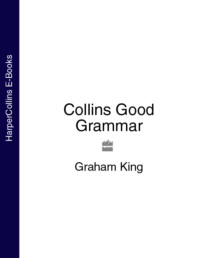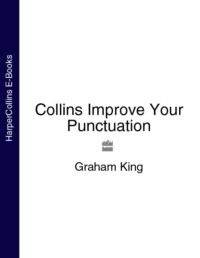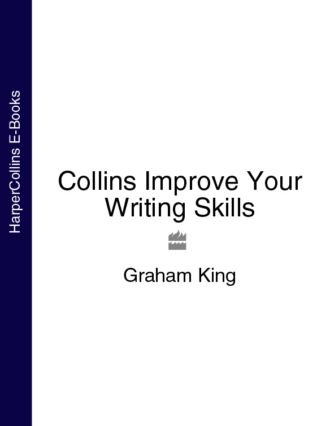
Полная версия
Collins Improve Your Writing Skills

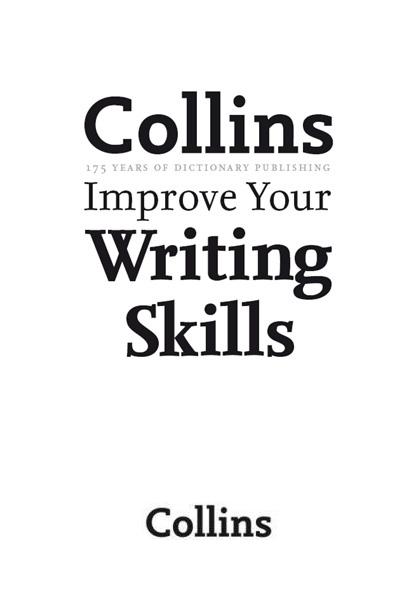
Contents
Cover
Title Page
Introduction
From Here to Obscurity
THE NO-GOOD, THE BAD AND THE UGLY:
Obstacles to clear communication
The long, long trail a-winding: Circumlocution
An utterly unique added extra: Tautology
Witter + Waffle = Gobbledegook
Smart talk, but tiresome: Jargon
Saying it nicely: Euphemism
A word to the wise about Clichés
CLARITY BEGINS AT HOME:
How to improve your powers of expression
Circumambulate the non-representational: Avoid the abstract
Overloading can sink your sentence
Avoiding the minefield of muddle
Measuring the murk with the FOG Index
MAKING WORDS WORK FOR YOU:
A refresher course in Grammar and Punctuation
Punctuation needn’t be a pain: Stops, commas and other marks
The building blocks of good writing: Grammar without grief
Writing elegant, expressive English: The elements of style
Finding out: a word about dictionaries
HOW TO WRITE A BETTER LETTER:
Say what you mean; get what you want
Communicate better with a well-written letter
Relationships by post: Strictly personal
Protecting your interests: Complaining with effect
Staying alive: Employer and employee
Selling yourself: Creating a persuasive CV
Getting it and keeping it: Money matters
Writing in the new millennium: Word processing and E-mail
Index
Keep Reading
About the Author
Copyright
About the Publisher
Introduction
Having picked up this book the odds are that you are a writer. Perhaps not a journalist or a novelist, but a writer nevertheless: of letters, memos, reports or even an occasional note to the milkman. You may keep a daily diary, or limit your output to greetings on Christmas cards once a year.
There is also a good chance that you suddenly have a need to write – a job application perhaps, a ticking off to the council, a heartfelt letter of condolence to a friend. Mind and pen poised, it slowly dawns on you that the gap between what you want to say and what hesitantly appears on the paper in front of you is as wide as an ocean.
Can you learn how to improve your writing skills? Can the art of good writing be taught? Despite some opinions to the contrary, the answer is yes. Writing is a highly personal accomplishment and while some will spectacularly develop native talents others will always find it a frustrating slog. But everyone is capable of enhancing their powers of written communication simply by learning and practicing the basic principles of clear, concise and coherent writing: planning, preparation and revision. Further improvement comes from observing examples of good and also bad writing, and your confidence as a writer will grow as you begin to appreciate that the English language is not a fearsome book of rules but an unrivalled communications tool that you can learn to use with the familiar ease of a knife and fork.
It is important at the outset that you are aware of the difference between speech and writing. You may think, ‘If only I could write as easily as I speak!’ Unfortunately it’s a wish that’s rarely granted. When we talk to someone face to face (or even over the phone) we can instantly correct mistakes and clarify misunderstandings, provide subtle nuances with a smile, a laugh or a shrug, add emphasis with a frown or tone of voice. But when we write something, we have just one shot to hit the bullseye so that whoever reads it understands it – precisely. Two millennia ago the Roman orator Cicero offered a pretty good tip: the point of writing is not just to be understood, but to make it impossible to be misunderstood.
The ability to write well is a valuable, life-enriching asset and Collins Good Writing Skills will help you towards this goal. Much of what you will read is the lifetime word wisdom of a veteran national newspaper sub-editor. Sub-editors are a newspaper’s front-line defence against inaccurate, ungrammatical, long-winded, repetitious and pompous writing – and thus the reader’s best friends. A group of Daily Telegraph sub-editors decided that a new shorter 60-word police caution was still too ponderous and proceeded to distil the same meaning into 37 words. Here is the 60-word version, devised by a Scotland Yard committee:
You do not have to say anything. But if you do not now mention something which you later use in your defence, the court may decide that your failure to mention it now strengthens the case against you. A record will be made of anything you say and it may be given in evidence if you are brought to trial.
And here is the revised, sub-edited version, clearer and shorter:
You need say nothing, but if you later use in your defence something withheld now, the court could hold this against you. A record of what you say might be used in evidence if you are tried.
No long or obtuse words, no flowery phrases – just crystal-clear prose that makes few demands on a reader’s time, holds the reader’s interest throughout and simply can’t be misunderstood. That is the kind of model this book recommends, although you will also be amused and appalled by dozens of other masterpieces of a vastly different kind – masterpieces of drivel and obscurity to drive home the sort of writing to avoid.
Into the jungle, with machete and pen
But first, let us be brave. We are about to hack our way through a jungle. The dense, tangled world of obscure and impenetrable language. Officialese. Circumlocution. Tautology. Gobbledegook. Jargon. Verbosity, pomposity and cliché. All the ugly growths that prevent us from understanding a piece of writing.
Perhaps the obstacle is a notice from our bank, the district council, the water, gas or electricity supply company, which for all we know might have a serious effect on our future. Or it may be a newspapaper or magazine article that makes us stop in mid-sentence to realise that we do not understand its meaning. Or perhaps it’s an advertisement for a job we might fancy . . . if only we knew what the wording meant.
This book, however, is not intended to help the baffled reader to fight through the thickets of spiky legalisms, prickly abstractions and tangled verbosity. Rather it is a guide to help you, the writer of the letter, memo, report or CV, to make sure your writing is clear of such obstacles to understanding.
Don’t be a sloppy copycat!
In business and bureaucracies, it is fatally easy to fall in with the writing habits of those around you: sloppy, vague and clumsy.
Yet most of us realise that a letter, memo or report from someone who knows how to write clearly and with precision is obviously more welcome, and read more keenly, than a dreary wodge of waffle and wittering.
Your own writing will be most effective when it is clear and direct. People who write in a straighforward way always shine out against the dim grey mass of Sloppies.
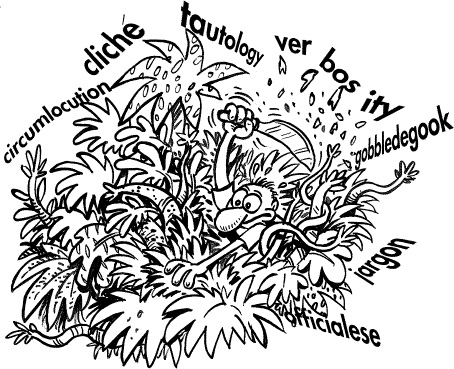
To be a good writer you have to write tighter
The usual advice on clear expression is: ‘Write as you speak’. But we have already concluded that unless you have special gifts or professional skills, this is virtually impossible. Perhaps the advice should be amended to: ‘Write as you speak – say what you mean, but make it tighter’.
One simple way to accomplish this is always to think economically. Less is often more. Some of the greatest thoughts and concepts in history have been expressed in surprisingly few words. The Ten Commandments are expressed in just 130 words; the Sermon on the Mount in 320, Kipling’s poem ‘If’ is less than 300 words long and the American Declaration of Independence was made in 485 words.
On the other hand a recent EEC internal memo on aubergine production and marketing issued in Brussels hit a word count of 9,800! Of all these, which would you think is the most readable?
The same applies to words: shorter is better. Many famous writers of the past were experts at saying what they meant in very few words, and simple, often one-syllable words at that. Milton and Shakespeare were deft users of simple words but for beauty achieved through sheer simplicity it is hard to beat Robert Herrick’s The Daffodils:
We have short time to stay, as you,
We have as short a spring;
As quick a growth to meet decay,
As you, or any thing.
We die,
As your hours do, and dry
Away,
Like to the summer’s rain;
Or as the pearls of morning’s dew
Ne’er to be found again.
With the exception of just a few words (decay, away, summer’s, etc) every word of this stanza is of a single syllable, perhaps symbolic of the brevity of life, and it is a model that every writer could aspire to.
Of course economy of expression isn’t everything and it can be misleading to argue the toss between long and short words, concrete or abstract nouns, active or passive voices. What is important is selecting the right word, and putting it in the right place for the right reason.
Before you begin to write . . . THINK!
Another English writer, William Cobbett, declared that ‘He who writes badly thinks badly’. You could usefully reverse this. A minute’s thought before a minute’s writing is advice worth thinking about, perhaps on the following lines:
What do I want to say?
Am I making just one main point, or several?
If several, what’s the order of importance?
You may find it worthwhile to jot down your points before starting your letter, or report, or story. Once you’ve organised your material you can then concentrate on expressing it in writing, getting the right words in the right places.
When you’ve completed your writing – and this is the vital bit – read it through and decide, as critically as you dare, whether you’ve got it right. Try to put yourself in the shoes of the reader. Is the meaning clear? Is it expressed directly? Is it interesting to read? How would I feel after reading it? If the answers to any of the first three questions is ‘no’ or even ‘well . . . ’ you should try to face up to rewriting it. Nobody pretends that rewriting isn’t an unwelcome task but the reward is worth it – the satisfaction of having improved upon your first effort. Of course, if you use a word processor the job of rewriting (often sentence by sentence or paragraph by paragraph) is easier.
Thinking before writing will help you avoid clangers like this paragraph from a bank’s letter to a customer:
We will not charge the £19 and £23 fee if your account had an average cleared credit balance of at least £500 during the period we were charging for. If you only pay a charge as a result of a charge you paid in the previous charging period, we will refund this second charge if you ask.
Pardon? Oddly enough, this piece of nonsense bore the Crystal Mark, the seal of clarity approved by the Plain English Campaign, which brings us to the two key organisations in Britain devoted to the elimination of drivel and gobbledegook and the encouragement of clear language and plain English.
The Golden Bull vs the Golden Rhubarb
The self-appointed guardian angel of our national tongue is Chrissie Maher, OBE, founder of the Plain English Campaign. Remarkably, Ms Maher, who was brought up by a widowed mother in a poor household in wartime Liverpool, did not learn to read or write until she was in her teens. The disability dogged her until, during a job interview with an insurance company, she admitted she was illiterate. Instead of rejection she was told she could have the job, provided she studied at night school; three years later she could read, write and count. In her adult life she went on to a degree course in sociology.
A deprived background made Chrissie Maher keenly aware of how uneducated people were fobbed off by officialese they couldn’t understand, and how they were often coerced into signing important documents and forms, with little idea about what the small print meant. When she came across a case in which an old lady died of hypothermia because she couldn’t understand the application form for a home heating grant, she decided to do something about it.
Maher launched the Plain English Campaign in 1979: since then, with its relentless exposure of bureaucratic pomp and absurdity, it has become both feared and admired. It prompted a government review which resulted in some 36,000 official forms being scrapped and another 60,000 rewritten to make them more easily understood. It is frequently hired by organisations to vet their forms and sales literature and issues a ‘Crystal Mark’ to commercial prose which passes its standards of clarity. To transgressors of simple English however, it issues its annual Golden Bull awards. Winners of this trophy – appropriately a pound of tripe – include the Department of Agriculture which defined cows, pigs and sheep as ‘grain-consuming animal units’, a car sales firm which described a used car as a ‘pre-enjoyed vehicle’, and the National Health Service for defining a bed as:
A device or arrangement that may be used to permit a patient to lie down when the need to do so is a consequence of the patient’s condition rather than a need for active intervention such as examination, diagnostic intervention, manipulative treatment, obstetric delivery or transport.
The more recent Plain Language Commission has identical objectives and issues its own annual awards – the Golden and Silver Rhubarb trophies for the year’s most baffling documents.
Both organisations waged a war of blunt words in 1995 when the Commission awarded NatWest Bank a silver trophy for what it called an example of the year’s worst gobbledegook in a booklet about mortgage rates, part of which read:
Depending upon the type of mortgage you have, repaying early can have certain financial consequencies [sic], for instance, early repayment of a mortgage and surrender of an endowment policy, may leave you with a small surrendering sum, which may not reflect the actual monies invested. Alternatively, cancellation of a life policy without considering future needs may ultimately mean increased premiums for the same amount of life cover in the future.
To the embarrassment of the Plain English Campaign, NatWest Bank had just been nominated for its ‘Crystal Clear Bank of Europe’ award for the ‘ease with which its literature could be understood’!
You may wonder, when the experts in concise, coherent communication disagree so profoundly, whether you will ever see the clear light of day through the other side of the jungle. But take heart and read on and you will learn how even the most dense thicket of verbiage can be trimmed and tamed.
From Here To Obscurity
If language can be like a jungle sometimes, officialese is the minefield laid among the thorny thickets and clinging creepers. And despite the successes of the Plain English teams, officials in government, local councils and other bureaucratic organisations still too often try to lure us into their baffling word mazes.
The language of officialdom can obliterate all meaning. Feel the undergrowth closing in as you try to fight your way out of this trap dug by the former Department of Health and Social Services . . .
The Case of the Crippled Sentence
A person shall be treated as suffering from physical disablement such that he is either unable to walk or virtually unable to do so if he is not unable or virtually unable to walk with a prosthesis or an artificial aid which he habitually wears or uses or if he would not be unable or virtually unable to walk if he habitually wore or used a prosthesis or an artificial aid which is suitable in his case.
This would-be ‘sentence’ first of all reflects the legalistic terror of official punctuation: the full stop or comma which, if misplaced, might lead the Department all the way to a House of Lords appeal. And, second, it ignores or offends half the population – women – by exclusively using the masculine pronouns he and his.
So let us take our machete to the undergrowth, bring in the mine detectors and wire-cutters, and try to discover what, if anything, this passage struggles to convey. A step at a time, too, for fear of booby traps.
A person shall be treated as suffering from physical disablement . . . treated?
This is not intended as medical advice, but since the context is medical the reader may, however briefly, be confused. Lift out treated and replace with considered. Throw treated into the shrubbery.
Suffering from physical disablement. Why not simply physically disabled? And while we are at it, we don’t need as after considered. Toss that into the shrubbery too.
So far, in our cleaned-up version, we have ‘A person shall be considered physically disabled’ – and we don’t seem to have lost any of the intended meaning.
Such that he is either unable to walk or virtually unable to do so. Wrench away the clumsy such that he is and replace it with which makes him (we’ll come to the offending pronouns later). Next, we cut out either, because we don’t need it.
We now have which makes him unable to walk, or virtually unable to do so. This can be more tightly expressed as which makes him, unable, or virtually unable, to walk.
Peering into the darkening thicket we next tackle if he is not unable or virtually unable to walk with a prosthesis or an artificial aid which he habitually wears or uses . . . Stop! The rest is just the gibbering of jungle monkeys. This seems to mean that the person can get around, but only with the help of a prosthesis or other artificial aid. The word even, before if he is not, would have helped. But we really do not need this tangled heap of words at all.
The entire ‘sentence’, if it means anything, must surely mean this:
A person is regarded as physically disabled if he or she always needs an artificial aid to walk.
We can of course replace the masculine and feminine pronouns with that person:
A person is regarded as physically disabled if that person always needs an artificial aid to walk.
As you can see, the meaning remains clear. But what about the prosthesis, you may ask. Well, there are thousands of people with prostheses in the form of replacement hips and knees and other artificial body parts who are bounding about without the least need of any artificial aids – wheelchairs, zimmers and walking sticks – so the amended versions are perfectly valid.
The Case of the Crippled Sentence is a prime example of the need to think ‘What do I want to say?’ And then to say it, the simple way.
A serious case of effluxion
Here’s a verbal smokescreen from a London borough council:
And take further notice that under the provisions of Section 47(2) of the said Housing Act 1974 in relation to any land consisting of or including Housing Accommodation in a Housing Action Area a landlord must not less than four weeks before the expiry by effluxion of time of any tenancy which expires without the service of any Notice to Quit, notify the council in writing that the tenancy is about to expire in accordance with the said Schedule 4 . . .
This is a model of mixed officialese and legalese: you can almost see the glint of watch-and-chain on the Town Clerk’s egg-stained black waistcoat. How do we turn it into something like English, without losing any legal force the passage might be required to have?
For a start, there appears to be no need for And take further notice. If the reader is not going to take notice, there seems little point in the writer’s finishing this masterwork. Next: under the provisions of Section 47(2) of the said Housing Act 1974 – the words the provisions of are redundant. Let’s lose them. The same goes for said.
And next: in relation to any land consisting of or including. The lawyers can keep their consisting of or including, just in case they are struggling to cover, say, a backyard or front garden where someone lives in a caravan. But in relation to can be shortened to concerning. We have now brought concerning clumsily close to consisting, so let us replace consisting of with that consists of. The word Accommodation after Housing is not needed. And once Housing is left standing by itself, the capital H becomes even more obviously unnecessary.
Plodding on: a landlord must not less than four weeks before the expiry by effluxion of time . . . Quickly to the dictionary – to seek out the meaning of this excitingly unfamiliar word, effluxion. We find:
Efflux, n. Flowing out (of liquid, air, gas; also fig.) That which flows out. Hence effluxion, n. See effluence, n.
From its meaning the word certainly suits the prose style, if nothing else. But we can do without effluxion. And we can also do without expiry.
Now, what is the rest of the message? It seems that in a Housing Action Area, if a landlord knows that a tenancy is running out and no notice to quit is needed, he must warn the council, in writing, at least four weeks before that tenancy is due to end. So let’s tack that information on to our earlier repair:
Under Section 47(2) of the Housing Act 1974, concerning any land that consists of or includes housing in a Housing Action Area, if a landlord knows that a tenancy is due to end without need of a notice to quit, he or she must tell the council, in writing, at least four weeks before the tenancy runs out.
The passage is no nail-biter and is still scarcely slick or smooth. But it is quite readable and clear and certainly less forbidding than the original mess.


